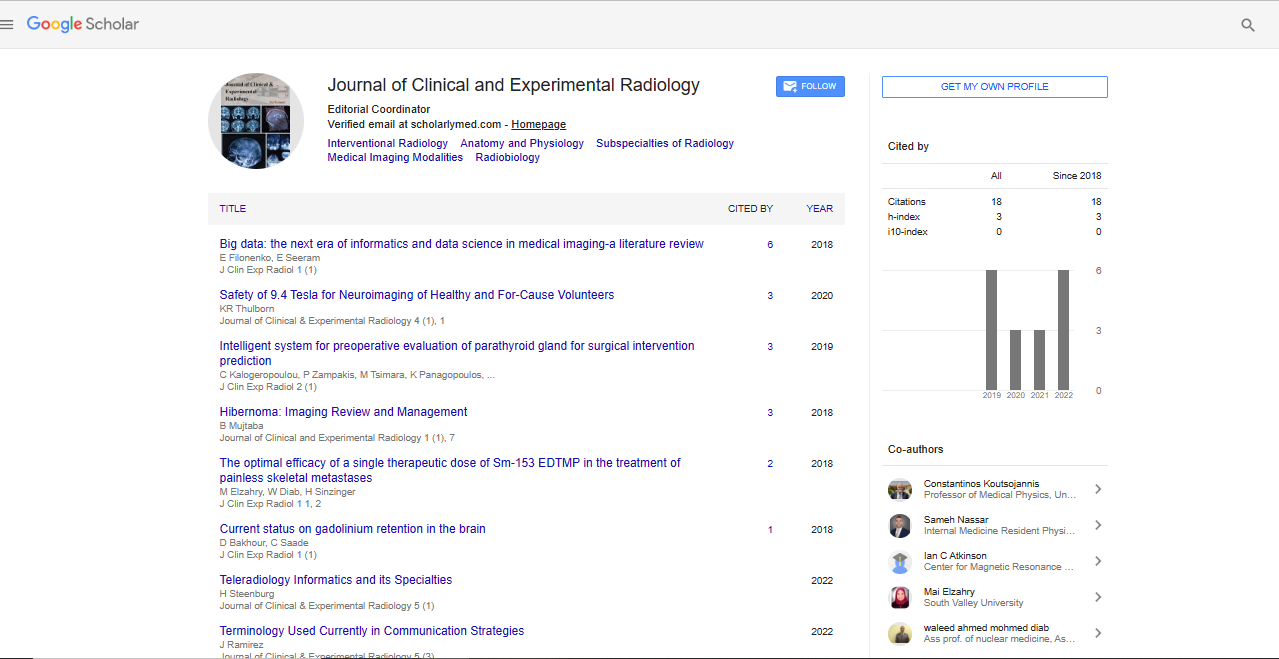Opinion Article, J Clin Exp Radiol Vol: 6 Issue: 1
Radiation Chemistry: Understanding the Chemistry of Ionizing Radiation
Joachim Blum*Department of Imaging, University College London, London, United Kingdom
*Corresponding Author: Joachim Blum
Department of Imaging
University
College London
London, United Kingdom
E-mail: blumjoachim@gmail.com
Received date: 20 February, 2023, Manuscript No. JCER-23-93121; Editor assigned date: 22 February, 2023, PreQC No. JCER-23-93121 (PQ); Reviewed date: 08 March, 2023, QC No. JCER-23-93121; Revised date: 15 March, 2023, Manuscript No. JCER-23-93121 (R); Published date: 22 March, 2023, DOI: 10.4172/jcer.1000124
Citation: Blum J (2023) Radiation Chemistry: Understanding the Chemistry of Ionizing Radiation. J Clin Exp Radiol 6:1.
Description
Radiation chemistry is a branch of chemistry that deals with the chemical effects of ionizing radiation. Ionizing radiation refers to high-energy particles or waves that can displace electrons from atoms or molecules, creating highly reactive species known as radicals. The study of radiation chemistry has important applications in various fields, such as nuclear power, medical imaging, and radiation therapy.
Rapid production of reactive species followed by intense competition between recombination processes and interactions with solutes are the hallmarks of radiation chemistry. A complete description of a radiation chemical process requires information about the final products and the transient species. Standard chemical techniques can be used to study the final compounds, and using scavengers that react only in certain ways has yielded a wealth of knowledge.
Mass spectrometry, photoelectron, and hoover ultraviolet spectroscopy have been used to gather information about the structures and identities of main ionic species. The study of free radicals has made extensive use of electron spin resonance techniques. The short-lived radicals have been stabilised using low temperature, matrixes, and "spin traps." The pulse radiolysis method, which is based on irradiating samples with a brief pulse of ionising radiation, has been used to gain a great deal of understanding into radiation processes and radiation-induced radical reactions. Typically, a heavy particle accelerator or an electron accelerator serves as the radiation source. Optical absorption spectroscopy, esr, conductivity, and polarography are methods used to monitor the transient behaviour of the radiolytically generated short-lived species.
Principles of Radiation Chemistry
When ionizing radiation interacts with matter, it can produce a range of chemical effects, including ionization, excitation, dissociation, and free radical formation. Ionization refers to the removal of an electron from an atom or molecule, leading to the formation of a positively charged ion and a free electron. Excitation refers to the promotion of an electron to a higher energy level, without ionization. Dissociation refers to the breaking of chemical bonds, while free radical formation refers to the creation of highly reactive species with unpaired electrons.
Radiation Chemistry of Water
Water is the most abundant substance in biological systems, and radiation chemistry studies have focused extensively on its interaction with ionizing radiation. When water is exposed to ionizing radiation, it can undergo various chemical reactions, including the formation of hydroxyl radicals, hydrogen radical, and hydrated electrons. These reactive species can lead to DNA damage, protein modification, and lipid oxidation, among other effects.
Applications of Radiation Chemistry
Radiation chemistry has a wide range of applications in various fields. In nuclear power, radiation chemistry is used to study the effects of radiation on reactor materials, such as metals and polymers. Radiation chemistry is also used in medical imaging techniques such as Positron Emission Tomography (PET), which uses a radioactive tracer to visualize metabolic activity in the body. In radiation therapy, high-energy radiation is used to kill cancer cells, and radiation chemistry is used to understand the mechanisms of radiation damage to cancer cells.
Radiation chemistry is an important field of study that helps us understand the chemical effects of ionizing radiation on matter. The principles of radiation chemistry have broad applications in various fields, including nuclear power, medical imaging, and radiation therapy. By studying the chemical reactions induced by ionizing radiation, we can develop strategies to mitigate the harmful effects of radiation and exploit its beneficial applications.
 Spanish
Spanish  Chinese
Chinese  Russian
Russian  German
German  French
French  Japanese
Japanese  Portuguese
Portuguese  Hindi
Hindi 